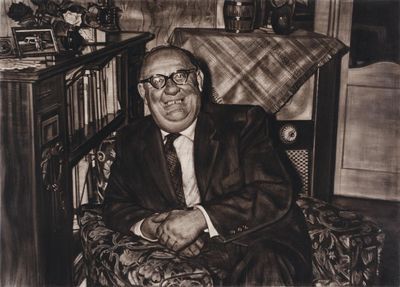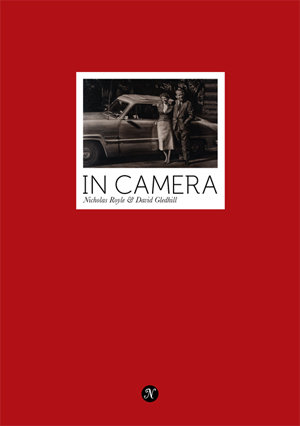Snap!
Look at this jolly chap ��� can you believe he was found abandoned in a flea market in Frankfurt? Or at least, some version was found there, by the painter David Gledhill, in an East German family album . . . .
How wonderfully fruitful such second-hand seedlings can be. Gledhill produced a series of oil paintings based on this ordinary collection of snapshots from the 1950s, and asked the writer Nicholas Royle to conjure a story out of the paintings. In Camera is the excellent result of their collaboration: published by Negative Press, which exists for the purpose of encouraging works that each take "a unique approach to mixing art and writing", it matches each of Gledhill's paintings to an answering page by Royle. A comic story emerges, told from a child's point of view. It turns on her curiosity about her father's newfangled camera:
"Not long after Father took up photography, I would sometimes come across his camera left lying around the house . . . . I was curious about this device, which on occasion he had allowed me and J to hold, but only as long as we were very careful and didn't press what he called the shutter. At night I would talk to S . . . about this shutter. She said [it] was a secret portal to another world . . . ."
A surreptitious take-over follows, reflecting Gledhill's adoption of the homeless snapshots that inspired In Camera. And there's also a gently sinister spin here, perhaps, on the Isherwood ideal of passively recorded material, that "Some day . . . will have to be developed, carefully printed, fixed", as the girl's own version of events is framed by various adult ones. After all, Father, pictured above beaming in his armchair, is a citizen of the Deutsche Demokratische Republik, and a doctor ��� the Stasi were not above approaching medical professionals as potentially useful informants. (How many doctors were involved, and how they were involved, with the Stasi has been, I'm told, a matter of hot historical dispute.)
Perhaps you could call In Camera an eccentric form of ekphrasis. In strict classical terms, that term refers to the description of a work of art in words, as in Homer's mighty description of the Shield of Achilles in the Iliad. The habit of stretching that definition is an age-old one, though; it takes in exalted poems such as Keats's "Ode on a Grecian Urn", Browning's "My Last Duchess" (imagined ekphrasis; Browning being, incidentally, the subject of the latest episode of TLS Voices) and Larkin's "Arundel Tomb". (You can find many more examples via the Poetry Foundation, by the way: "The Broken Fountain" by Amy Lowell, "In Goya's Greatest Scenes We Seem To See . . ." by Lawrence Ferlinghetti, "Tapestry" by Charles Simic, "Edward Hopper Study: Hotel room" by Victoria Chang, and more.)
Prose examples crop up everywhere, but whole books based on the same idea are rarer: they include Brigid Brophy's Prince and the Wild Geese, a story set to the graceful drawings of Prince Grigory Gagarin, and the National Portrait Gallery's Imagined Portraits, accompanying an exhibition of the same name. More recently, in Exchange, Chris Drury and Kay Syrad describe an unusual rural situation, that of three farms in West Dorset, in a similarly unusual way, combining Drury's drawings (on paper "matured" in the Dorset soil itself for eighteen months) with Syrad's verse and prose. "Walk along the track to the sheep barn, find the farmer checking udders for damage or disease . . . ."
I participated in a "live" exercise in ekphrasis a few years ago, providing some improvised musical accompaniment to a series of slides, again of domestic scenes, to which actors ad-libbed stories. (The slides being drawn from a collection some 5,000-strong that originated in another flea market, in Berlin this time.) The stories grew increasingly absurd with each click-and-slide of the projector, as domestic interiors gave way to mountainsides. The audience had long given up trying to make sense of all this, I expect, by the time we found ourselves in a submarine.
But at least this officially makes In Camera part of a noble artistic tradition. "We are all rootling around the flea market, but some of us are looking at the Stasi . . . ."
Peter Stothard's Blog
- Peter Stothard's profile
- 30 followers





